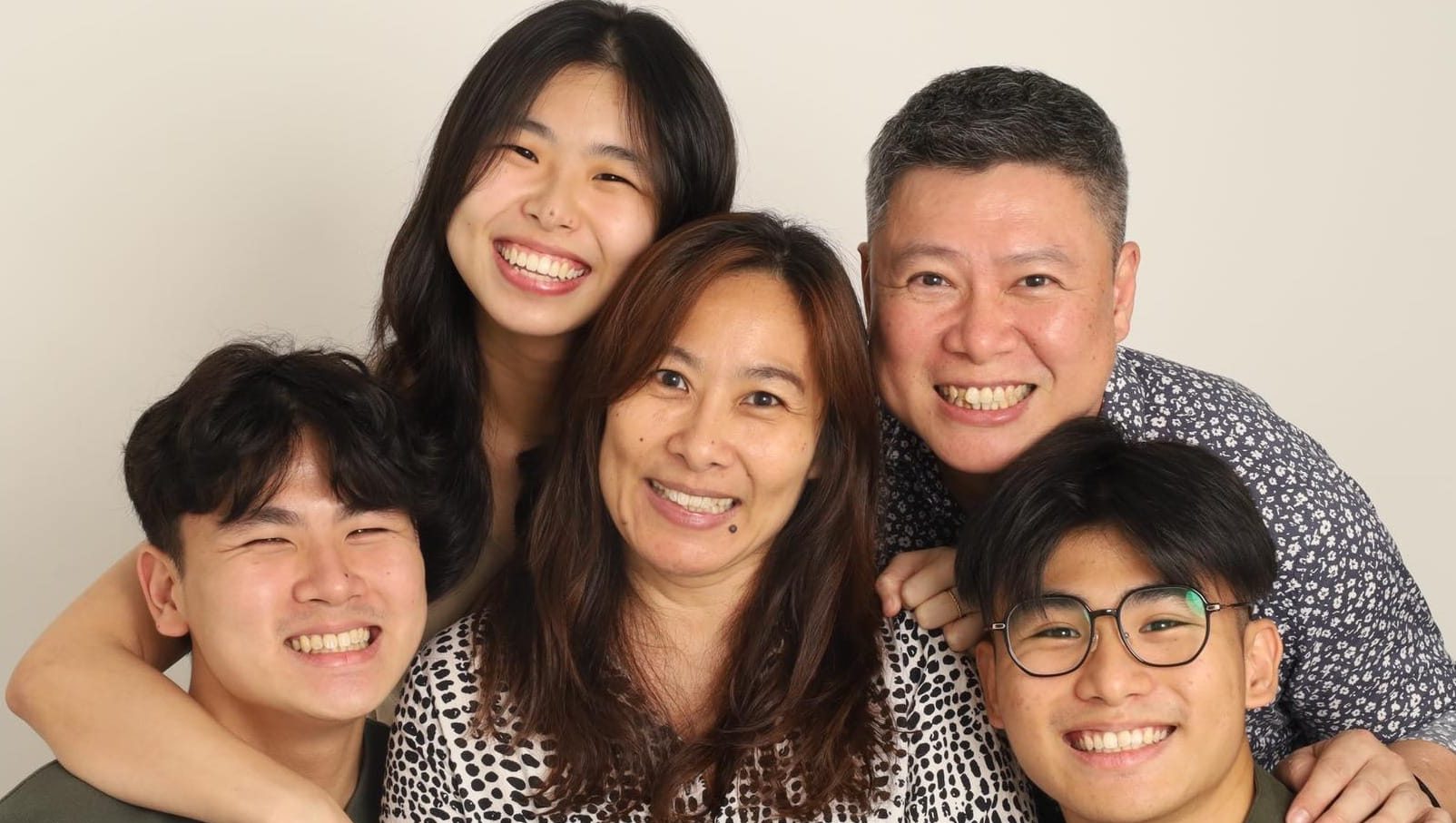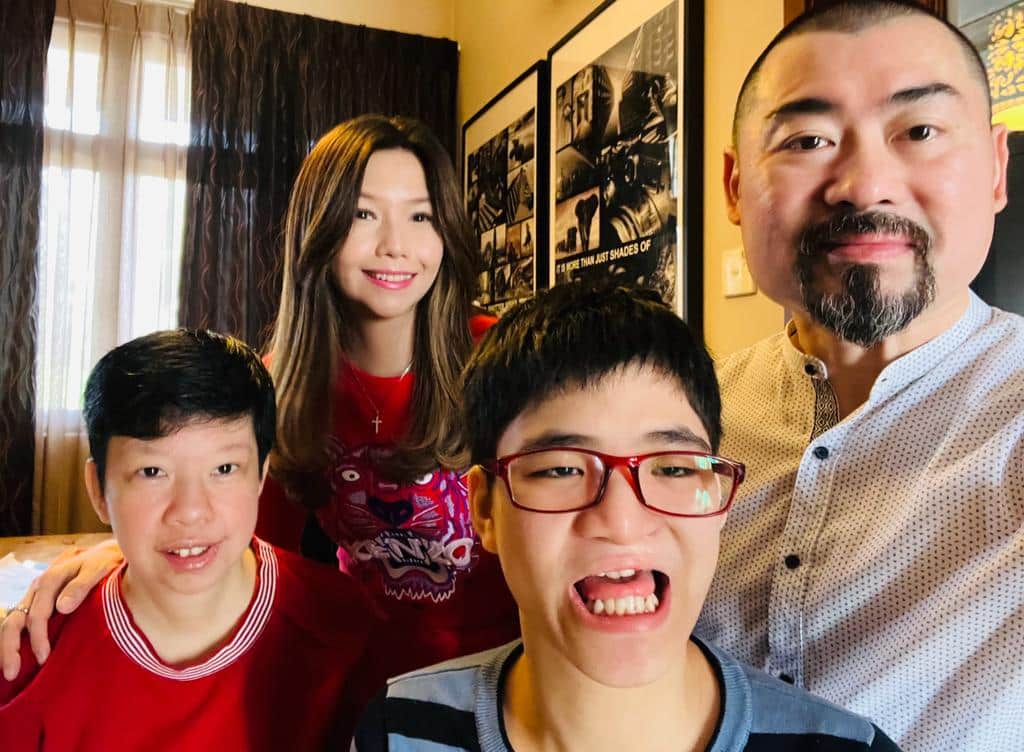At 16, he built a community around music where youth can serve children from troubled homes
This National Day season, Salt&Light highlights individuals and initiatives that bring the love of Christ to the underserved in society.
by Gracia Chiang // August 6, 2024, 12:18 pm
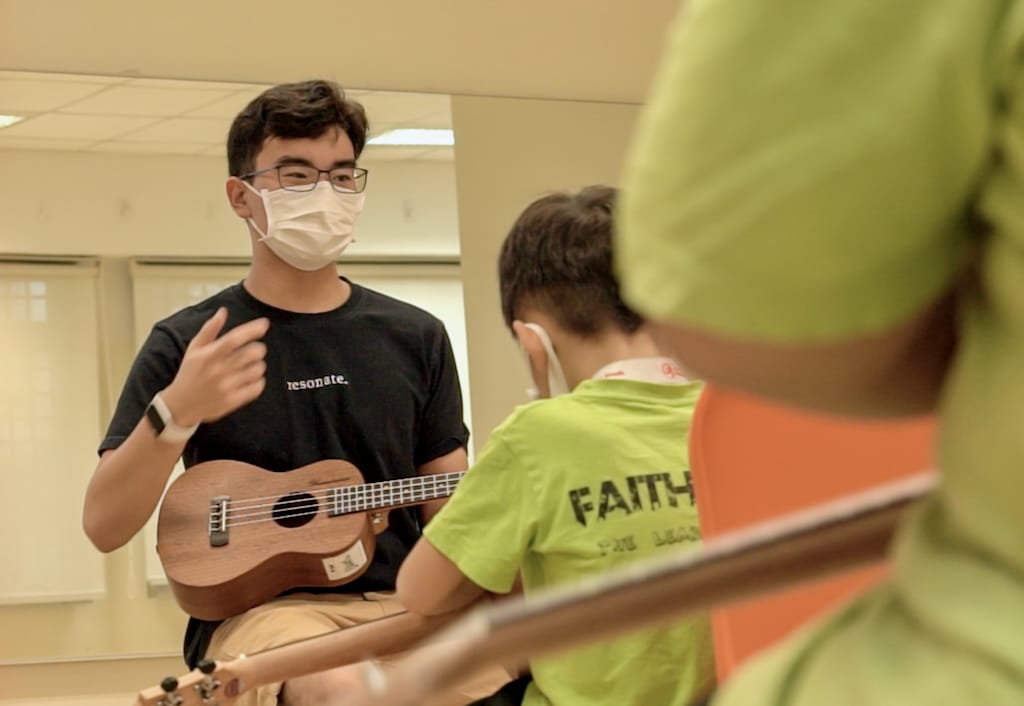
When Elijah Chao and his friend started The Resonance Project (Reso) three years ago, they never imagined that they would be creating a community where over 700 young people could serve. All photos courtesy of Elijah and Reso.
“Don’t let me hit you like your dad does at home.”
Stepping into the centre where he was volunteering to give music lessons to children for free, 16-year-old Elijah Chao would sometimes find himself confronted with heartbreaking moments.
Kids hurting one another – one threatening the other with violence that would only bring to mind the domestic abuse the latter was all too familiar with.
These were all just primary school students. But the experiences they had gone through in life had clearly left a deep impact on them.
That is why when Elijah and his classmate Ivan Chiew started The Resonance Project (Reso) in January 2021, they quickly realised that music could be a medium for mentoring kids.
From music to meaningful connections
Interestingly, it was also music that bonded the two friends.
At that time, both were Year 4 students at Anglo-Chinese School (Independent). Elijah was a drummer, while Ivan was a guitarist and pianist.
What began as just classmates jamming together turned into a common desire to share the joy of music with others.
“The initial idea was not meant to be anything big,” said Elijah.
Wanting to bring music education to those who did not have access to classes, the duo felt it would be more fun to do it in an informal way, focusing less on music theory and more on the practical aspect.
“Serving kids seemed obvious to us because that was where we thought we could make the most impact and could connect better,” he reasoned.
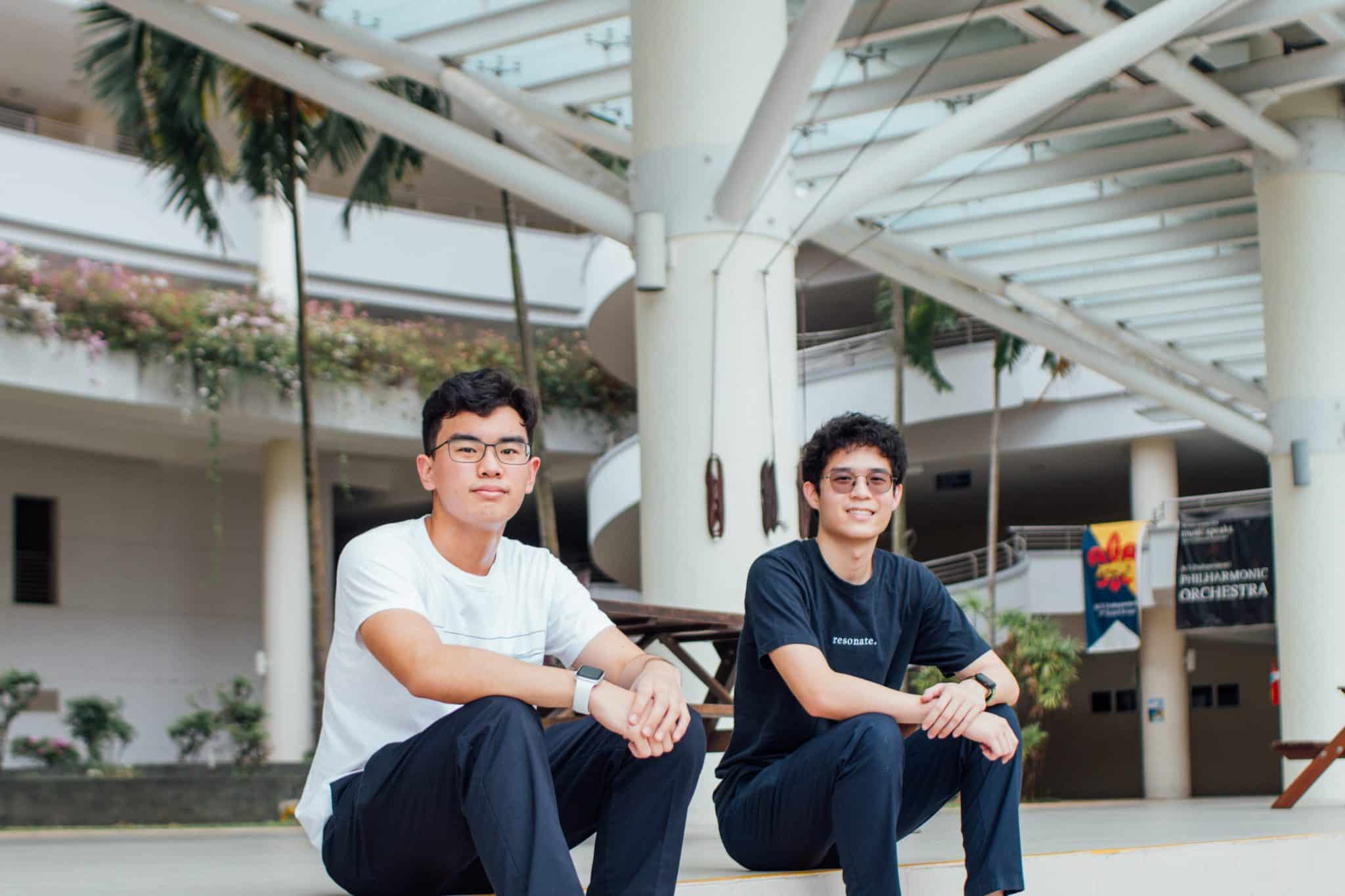
Elijah (left) and his co-founder Ivan. What started as an idea among friends quickly became a movement that drew other youth who wanted to serve.
Pleasantly surprised at the interest they got when they reached out to different social service agencies, by the end of their first month, they realised they could not do this themselves.
Kicking off recruitment, the pair focused on finding like-minded people through word of mouth, Instagram and WhatsApp.
What happened next was incredible. By March, the group had grown to around 130 volunteers helping out in three centres.
Unlike other youth initiatives where students were mainly from one or a few schools, Reso’s volunteers were also from all over the country.
From as young as age 12 all the way to 20 years old, students from secondary schools, junior colleges and polytechnics were signing up in droves.
“It was no longer just a service project – it was a movement.”
“When 100 plus people signed up, that flipped a switch. We started to realise – this is not just about one centre,” shared Elijah.
“It was not just doing a little bit of good. There was a slightly bigger opportunity.”
Despite having their operations affected by Singapore’s Phase 2 (Heightened Alert) measures for Covid-19 from July to August, by the end of the year, there were around 240 volunteers spread across more than 10 centres.
Dawning on them that Reso was not just about giving kids free music lessons, the co-founders recognised that they had just created a platform for young people to serve others.
“It hit us that it was no longer just a service project – it was a movement,” remarked Elijah.
Teens coming together to do good
Scrambling to come up with a structure, Elijah and Ivan spent the early months building Reso’s curriculum and community.
Lessons covered keyboard, ukulele, guitar and cajon, with each session running from one-and-a-half hours to two hours long.
Beginning with games and conversation time with the kids, this would flow into the core teaching segment and usually end off with the volunteers playing some songs and the kids singing along.
“It set the tone really well. You come in firstly as somewhat of a teacher and mentor. So that brings that association of ‘I’m here to help teach you,'” explained Elijah.
“But then you lighten that up by the fact that our volunteers are younger, and it blends quite well.”
Using a musical instrument to break the ice and build relationships also feels like having “a third person in the room”, he added.
“So if the conversation between a kid and a volunteer is a bit hard to continue, especially at the beginning, there’s something they can do.
“(Music) provides a catalyst for them to get to know one another, and fosters better and stronger conversations to follow.”
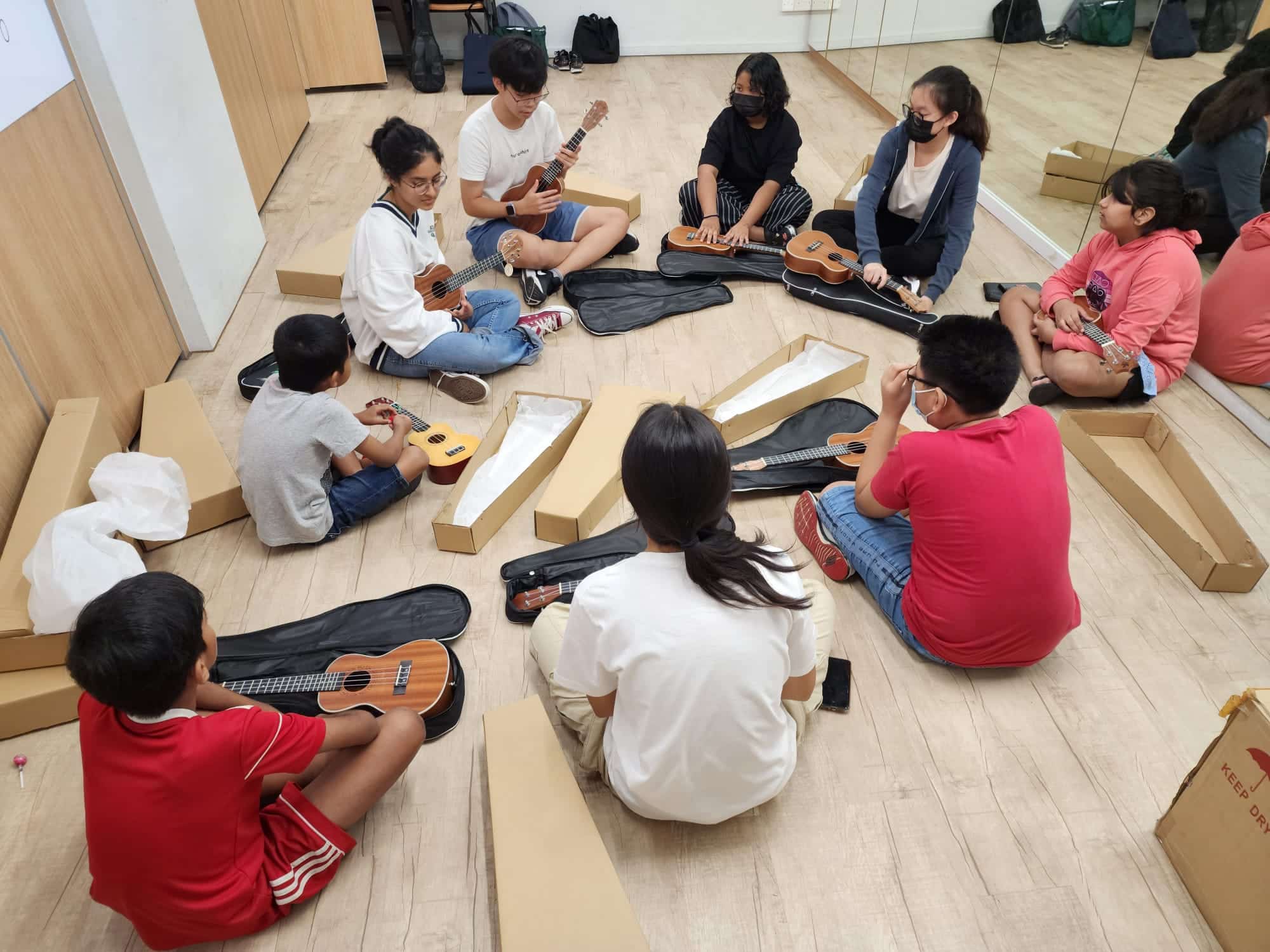
While Reso started with programmes for children, its volunteers are now serving over 200 beneficiaries both young and old across 20 centres throughout the week. These sessions take place three to four times a day.
In no time, they started to see their efforts pay off in small ways.
Recounting how there was a small kid in his class who was either always trying to do his own thing or very angry, things came to a head one day when he flipped off one of the volunteers.
Taking him aside for a chat, Elijah instructed: “I asked him to squeeze my hands as hard as he could. Then I just talked to him.
“I told him, ‘It’s okay to be angry. Anger is something you feel. But it’s not okay to be rude.’ From then on, he started slowly listening more and trying to participate.”
Observing that it has been important to give the children an outlet for their emotions, Elijah mused: “Sometimes we tell them the behaviour is wrong and we forget to address the emotions.
“But for some of them, they really do need time to express and talk. Their emotions are very real, very fair.
“I’m glad that our volunteers have been able to offer that. For us it’s about creating that opportunity and trying our best to provide that space.
“That’s one of the special things about being this age. We’re not centre staff. We’re not social workers. We’re like their kor kor (brother) and jie jie (sister).”
“We wanted (our volunteers) to be at their own discomfort… to love and serve others.”
Hearing first-hand what the kids in troubled homes were going through also shaped their attitudes towards the work they were doing.
“We didn’t want to be in a come-and-go kind of situation,” discerned Elijah.
“We wanted to be there, long enough and sustainable enough so that our volunteers could be there for many years and watch the kids grow up.”
As such, manpower was deployed in a way that reflected that.
While Reso’s teaching programmes were weekly, volunteers were rostered only fortnightly, serving every other week, on the same day at the same place and same time.
“This was one of the ways that we ensured our volunteers stay active. Weekly (service) is unsustainable because there is a lot of planning and preparation, so we have a Team A and Team B for every centre.”
However, Elijah also made it clear to volunteers that when they served, they should expect to be stretched.
“We knew that the situations they were going into would be sometimes quite uncomfortable,” he said.
“But we wanted them to be at their own discomfort, to be able to love and serve others.”
Highlighting that being uncomfortable while learning to serve is great for growth, Elijah shared that this conviction was influenced by the opportunities he had in his younger years.
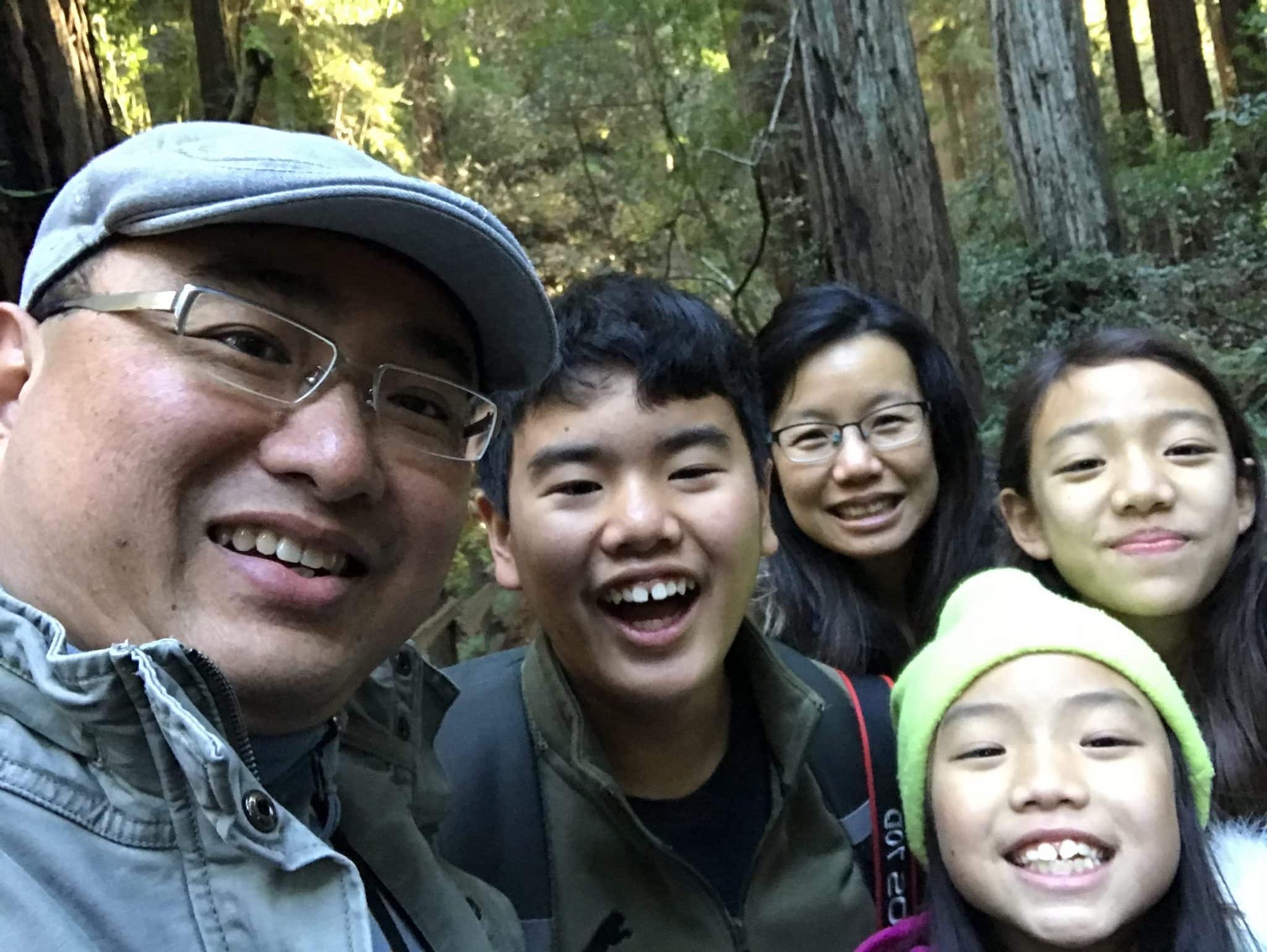
Elijah spent a portion of his teenage years in the US, where he grew in leadership skills. Elijah also credits his parents for inspiring him and his younger sisters with their missional outlook on life.
Growing through serving
At age 10, Elijah’s family moved to the US for his father, Rev Dr Bernard Chao, to pursue a PhD from Fuller Theological Seminary.
For the first year or so, it was hard to fit into his American public school and over time, the 11-year-old resigned to being lonely.
“I was just numb to everything already. It was tough finding friends, and I was actually not searching anymore at that point,” he admitted.
But when Elijah graduated to his church’s youth ministry, that was where he had his first taste of community. Opportunities to lead also soon followed.
“At my second session of youth group, my leader asked me, ‘Hey, can you lead worship with me?'” he related.
“I don’t know why I said ‘yes’, but there was something about her that was so welcoming. The people there were quite different.”
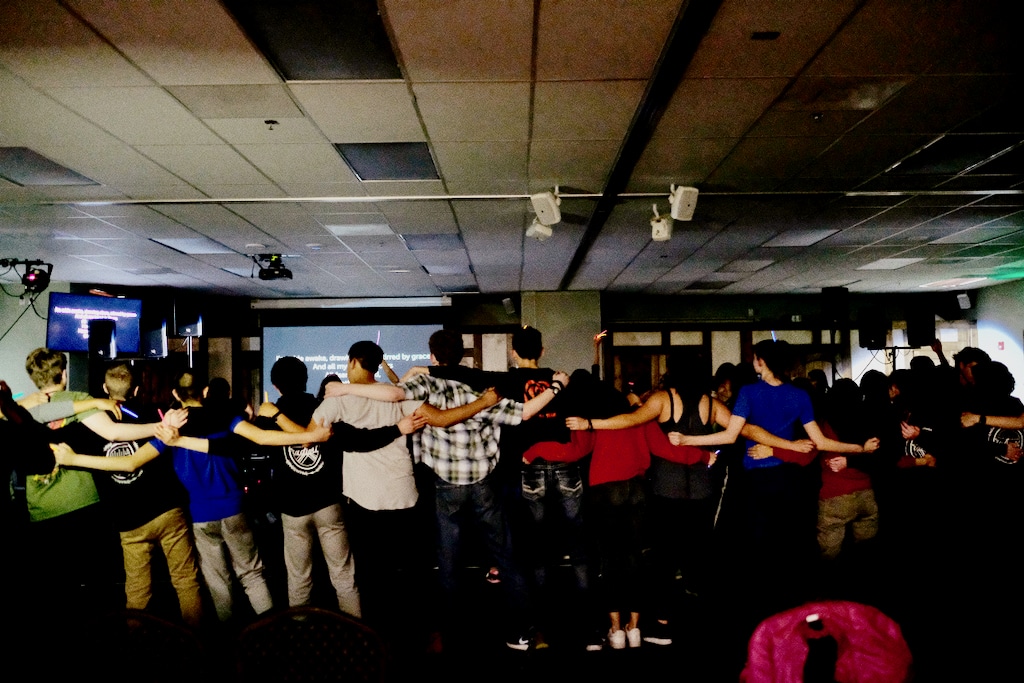
It was in youth ministry where Elijah learnt how community could feel like family.
Reflecting on the impact his different youth pastors had on him, Elijah said that they modelled for him what it meant to love God and serve others as a Christian.
Through spending time with these mentors, he saw their heart for the least and the lost.
“I got my first glimpse of what servant leadership looked like, and it completely shifted my idea of what it means to serve and lead,” added Elijah.
Being part of this fast-growing youth ministry also taught him a thing or two about hospitality.
“The moment someone new stepped in, he was only a stranger for a week,” he noted. “This is something that inspires how I build community now.”
Besides stepping up as one of the youth leaders in church, Elijah was also asked to lead his school’s Christian fellowship.
Remembering how his teacher-in-charge would give him the autonomy to plan big events, “that grew me in confidence and how to lead groups,” he said.
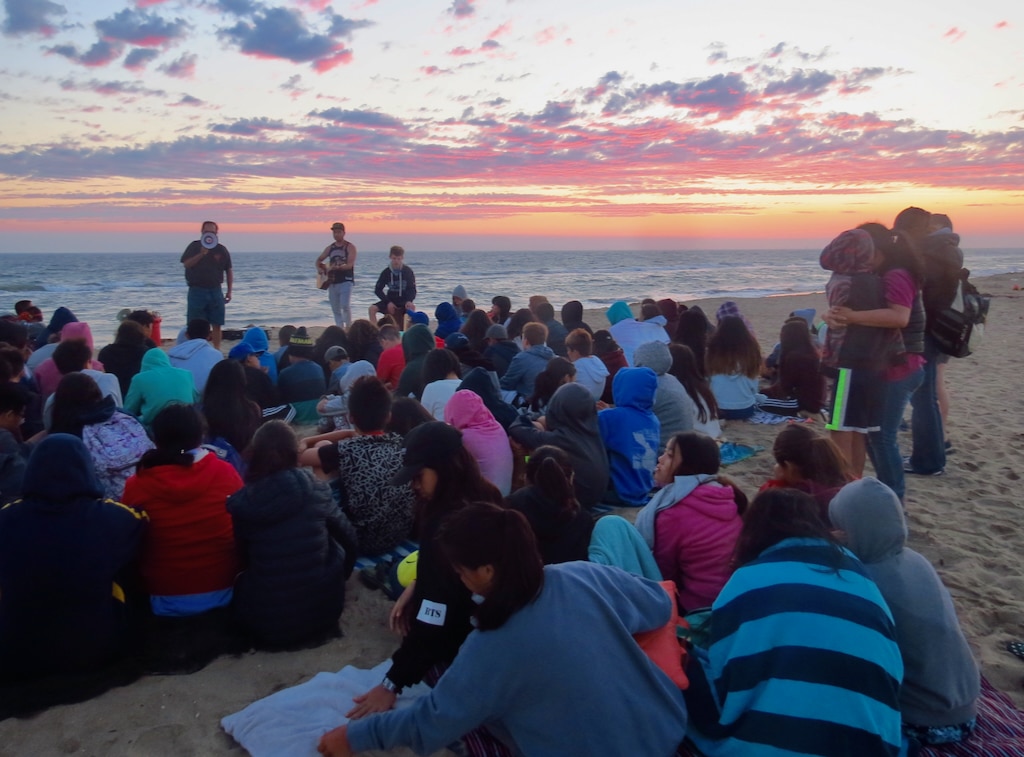
Confessing that he had many mistakes as a leader while serving in the US, Elijah realised that he was burning out his teams or not collaborating as much as he should have.
These were formative experiences that Elijah brought home with him when his family returned after five years in the US.
Starting Reso in his second year of being back in Singapore, that gave him the chance not to redo his mistakes and to mobilise others to serve alongside.
Unlike many youth projects, Elijah and and his co-founder sought “broad ownership”.
“We had a group of people who helped us start it. But we never wanted to have a core team,” he clarified.
In the early days, among the roughly 130 volunteers who were teachers and mentors for the children, around 60 per cent would also be serving in a second capacity, driving departments such as curriculum, community, administration and media.
Even though the current pool of volunteers has ballooned to around 250, this organisational structure has carried on until today.
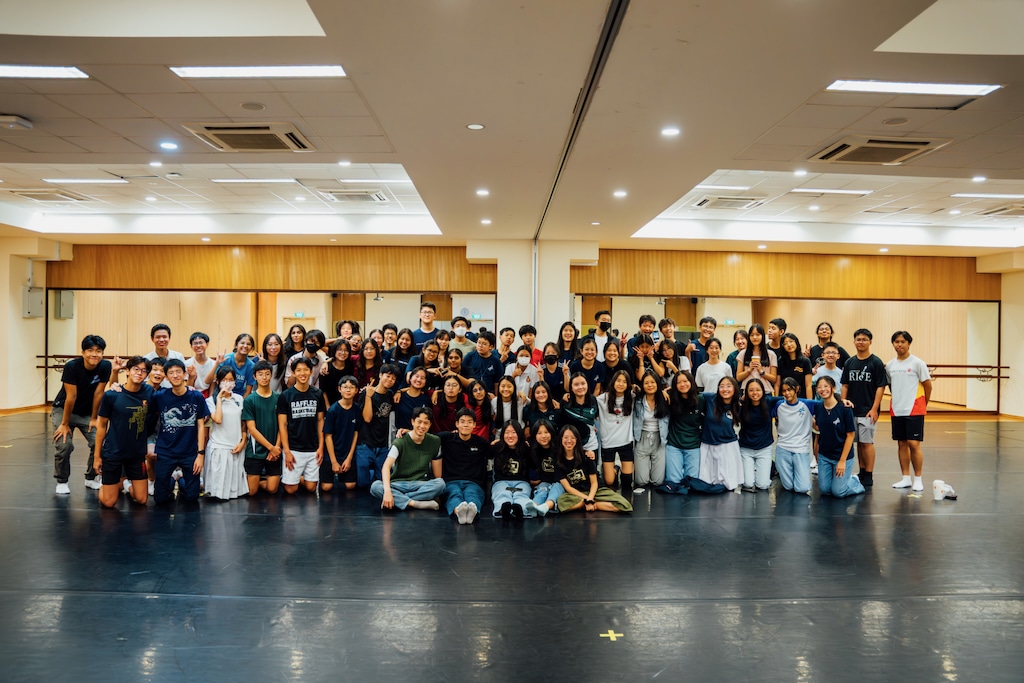
The experience of Reso has shown that so much can be done when young people come together to serve. This was taken during a volunteer orientation session in November 2023.
While Elijah relinquished his role as president over a year ago when he entered National Service, he is now serving as chair and advisor, making sure that the leaders get the mentorship they need.
“From the very beginning I knew I was going to step down eventually. That’s how we designed our leadership structure – to get to a stable level where (Reso) can run itself,” he said.
“That’s really the spirit that we want – to empower people. We want to show them that they can do lots of good and can make a real difference.”
Going into new spaces
Building a community of youth who are ready to serve others has also opened the doors to new avenues.
“Post-COVID, we had a lot of volunteers to allocate, so we were trying to figure out what was the next best area,” shared Elijah.
Sharing that he was moved by the fact that there are more than 70,000 seniors in Singapore who are living alone, Elijah and his team were keen to find out: Besides children, could music also be a way to befriend the elderly?
“We realised the synergies are much the same,” he discovered. “There’s so much our volunteers can gain just by talking to (the seniors) and listening to them.”
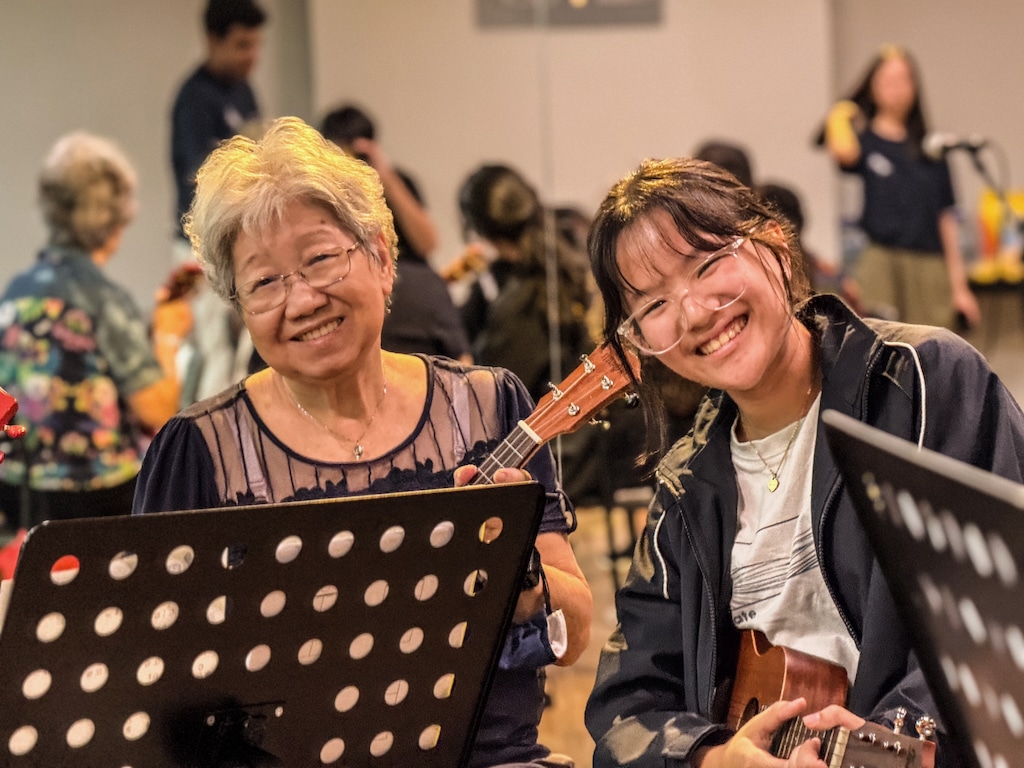
A senior and volunteer at one of Reso’s recitals.
Pointing out that the time taken to build friendships is often even faster compared to that with kids, Elijah himself has experienced so much joy from interacting with elderly beneficiaries, many of whom treat the volunteers like grandchildren.
Recalling a vivid memory when Reso was piloting its work at a senior activity centre, he added: “There were seniors queuing outside and being turned away by the centre staff.
“I was there luckily, and I said, ‘Please let them come in, we’ll get more ukeleles next week.’ That to me was really heartbreaking.”
Going beyond its core programmes of music lessons to at-risk children and seniors, Reso has also since expanded to include peripheral arms such as outreach and events.
Under outreach, Reso is bringing music to new audiences by organising community concerts across Singapore, such as community centres and nursing homes.
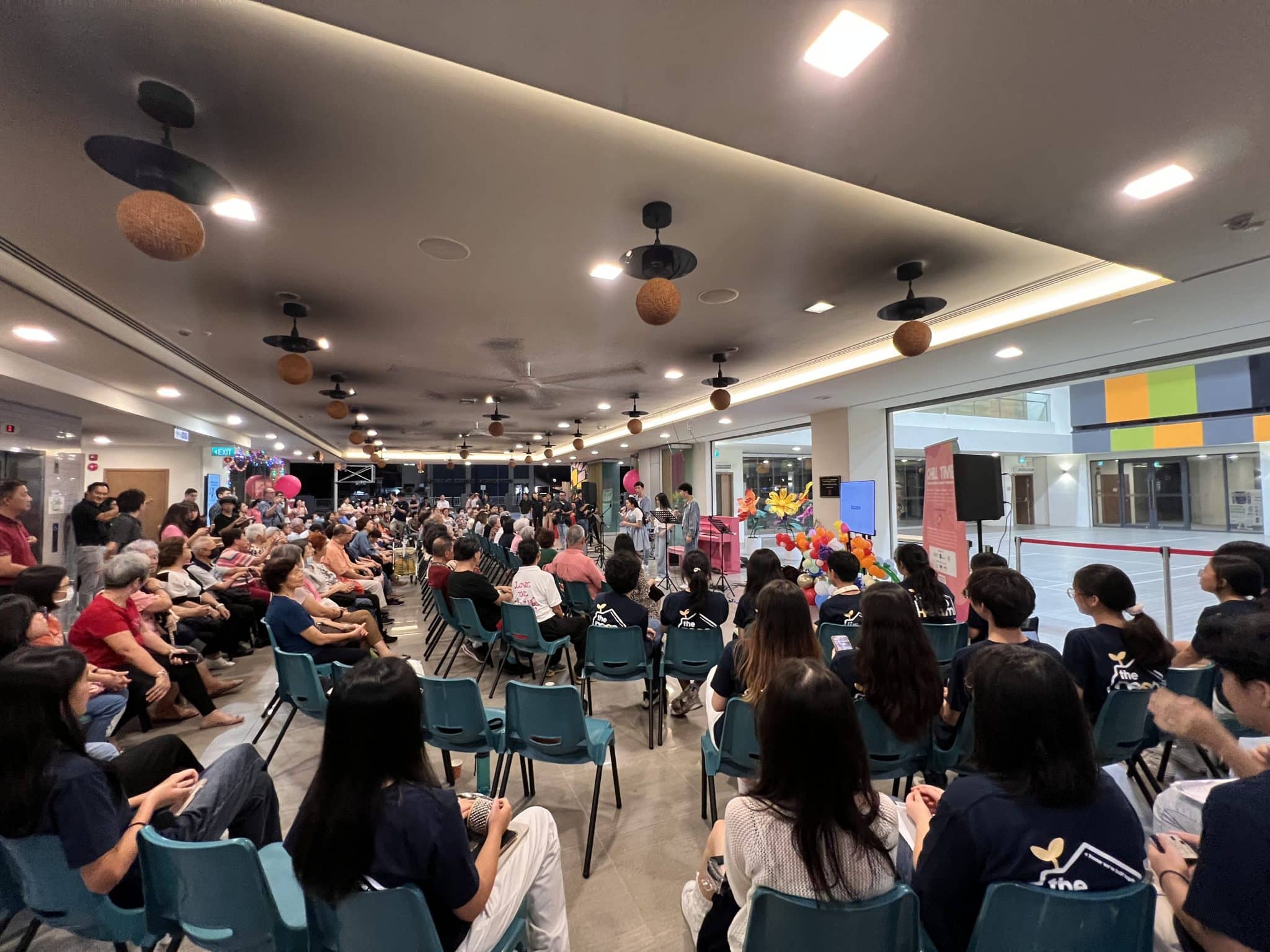
An outreach concert at Teck Ghee Community Club.
For events, the goal is to build deeper connections and foster better understanding among youth.
Due to the huge number of young people who have served with Reso – more than 700 members past and present – this has led Elijah and his leaders to develop a burden for their own age group.
“We think it’s important to serve and give back to our own youth community, and to advocate for volunteerism and a stronger community,” he said.
Recalling their first youth event in 2022, Elijah said it was a very emotional moment seeing 850 people gather for the final night for Resound, which was a concert with two shows at Gateway Theatre.
“The performers were members of our team and other youth who came to join us,” he continued.
“Every week, we have our team serving all these beneficiaries. But to see it in person, in a room, brought to life – that was quite amazing.
“We think it’s important to serve and give back to our own youth community.”
At the official launch of its events arm, Sonder, earlier this year, Elijah was also blown away by the 1,200 people who came together for two shows and two pre-shows at Victoria Theatre.
“It was done to such an incredible quality. Everyone worked together – we had performers from so many different backgrounds join us. We also had preview showings where our beneficiaries could come,” he said.
Explaining the reason behind the name of its events arm, Elijah described: “To sonder is to start to realise the immense depth and complexity of the people’s lives around you, to grasp how much you don’t understand and don’t actually talk about on a daily basis.”
On one hand, this means encouraging the writing of original songs to give voice to many of the stories that young people have.
On the other, the events organised by Sonder use music to bring youth together and spark conversations about complex issues such as friendships.
Sharing that this is also one way they are trying to tackle the problem of mental health among youth, Elijah observed: “There’s just a lack of joy, strong friendships and a strongly glued community. We want to be able to advocate for that.”
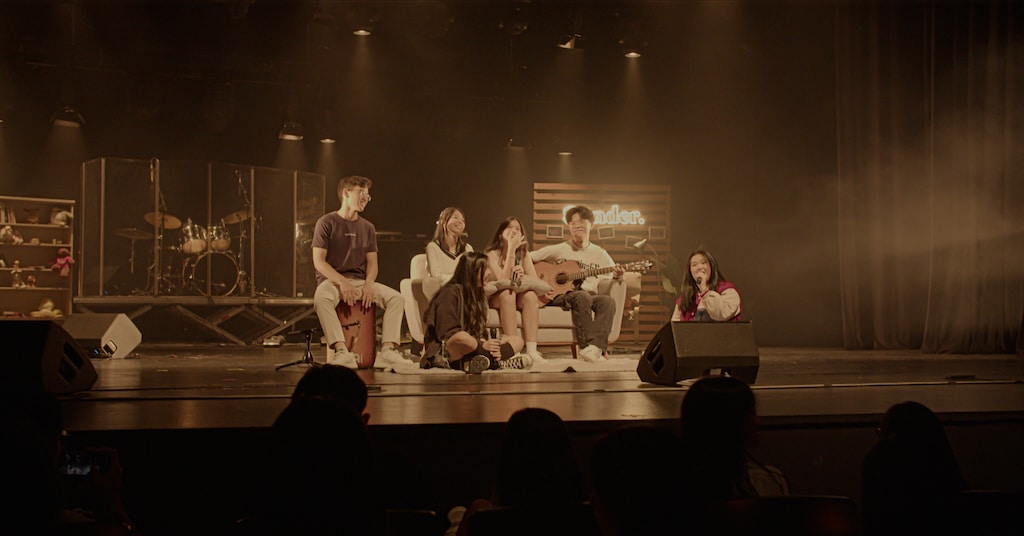
Elijah (far left) with Reso’s songwriting team presenting their first original song “New Beginnings” at Sonder.
Tracing the hand of God
Looking back at how his experience in the US played a big role in shaping what Reso is today, Elijah said: “The genesis of my understanding of community was from my youth group – from an environment where people feel welcome, feel understood, and feel cared for and safe.”
Describing Reso as his way of giving back, he added: “It was an incredible honour to be able to serve people, to speak into their lives, to say that we care. It was my ministry.”
Sharing about the impact that leading this group of volunteers has also had on him, Elijah said: “It’s been so clearly God’s journey of teaching me, of growing me.”
From journeying with different members who were struggling in their own lives, to creating a culture of how people should treat one another within the team, Reso has given Elijah the chance to reflect God’s heart.
“It’s taught me so much about the hurts that people go through, God’s love for people, and how precious the Christian view of friendship, brotherhood and community is,” he revealed.
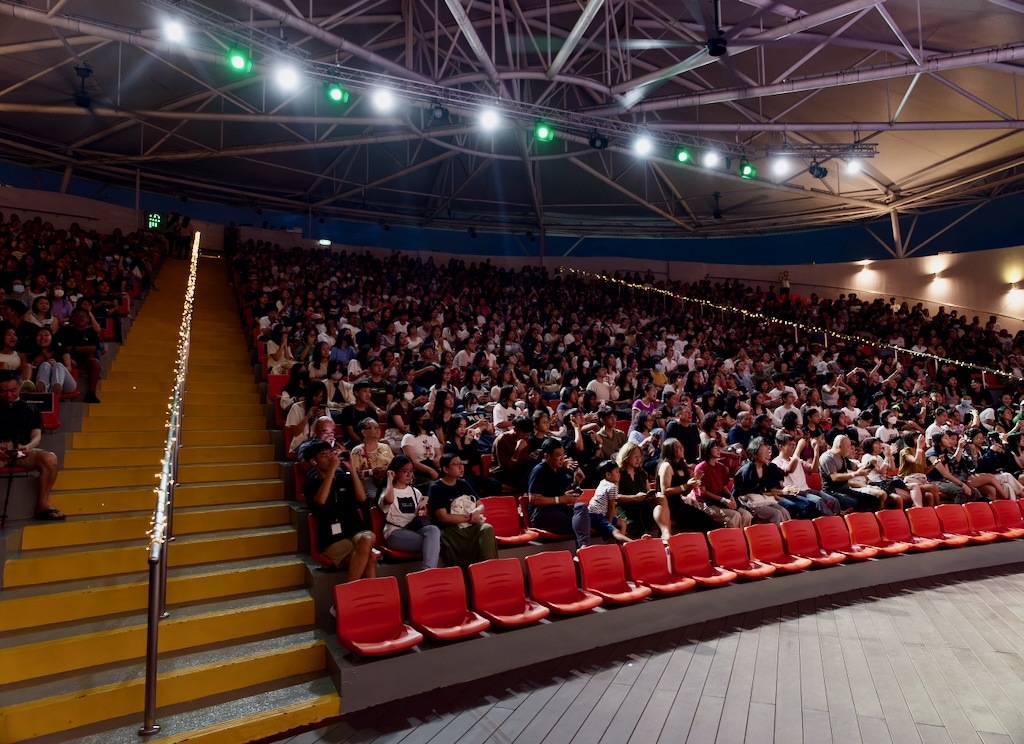
Every one of us has a spark inside. But what will you use it for? For last year’s Youth Day, Reso organised Ignite, a concert that celebrated all the good that youth can accomplish.
“We wanted to create a place that’s really different, so that we can be an experiment of what is possible when youth decide to come together and do good,” said Elijah of the vision he and Ivan had.
Calling this idea “fireworks”, he described: “It’s like firing a fireworks into the night sky. Each of us coming here is going to give our greatest shot.
“What we’re hoping is that someone else sees that and decides to work on their own fireworks. And it has this magical perpetuity that is not because of our own actions but because of a collective one.”
Opening up about his personal inspiration, Elijah said that the following quote that has often been attributed to John Wesley, the founder of Methodism, resonated with him.
Do all the good you can
By all the means you can
In all the ways you can
To all the people you can,
As long as ever you can.
He has also found encouragement in the words of the Apostle Paul.
Don’t let anyone look down on you because you are young, but set an example for the believers in speech, in conduct, in love, in faith and in purity. (1 Timothy 4:12)
Seeing God’s fingerprints on the growth of Reso over the last three years, Elijah can only marvel at how He brought along the right people at the right moment to give the right support.
“The whole thing is a miracle. At every stage, God’s providence has been very clear,” he concluded.
“It’s not something that we’ve created. It’s something that God has brought to pass.”
If you would like to find out how you can serve or support the work of Reso, please visit their website.
READ MORE NATIONAL DAY STORIES:
Cover our schoolchildren with these prayers, urge parents and educators
We are an independent, non-profit organisation that relies on the generosity of our readers, such as yourself, to continue serving the kingdom. Every dollar donated goes directly back into our editorial coverage.
Would you consider partnering with us in our kingdom work by supporting us financially, either as a one-off donation, or a recurring pledge?
Support Salt&Light
